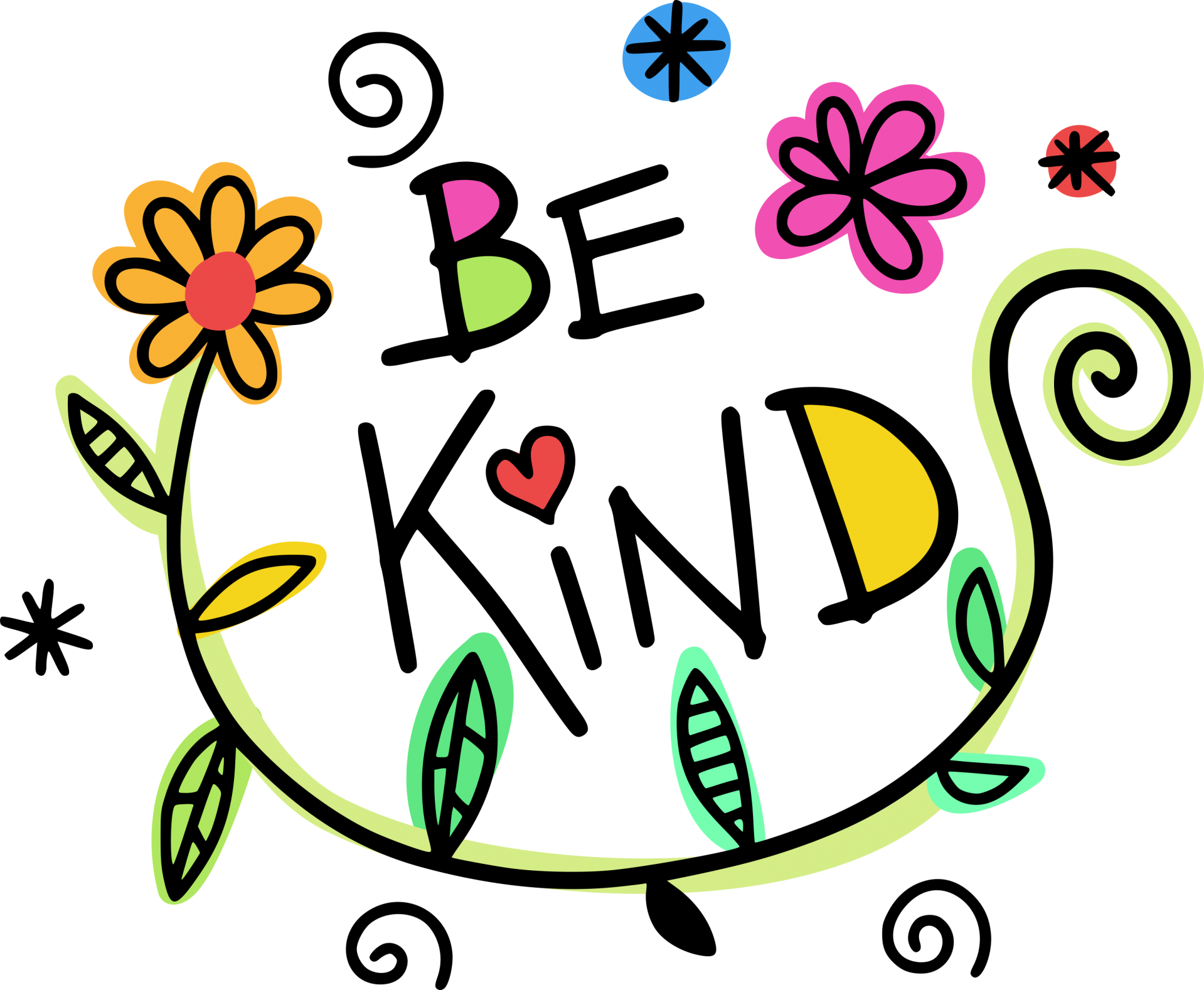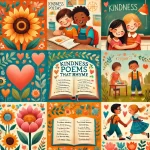Hey there, fellow educators and parents! Let’s talk about something that hits home for all of us: our kids’ mental well-being. You know, May’s Mental Health Awareness Month isn’t just a mark on the calendar; it’s a spotlight on something seriously important – our growing kids’ emotional lives.
Now, we have got this timeless secret weapon in our arsenal: kindness. Imagine it like a compass, and we are navigating our way through a terrain of growth and feelings. In this blog, we are diving into why kindness is like a supercharger for children’s mental health. And guess what? We are doing it with style – 10 handpicked quotes that will light up your understanding.
The power of those simple, kind acts shaping our kids’ minds. These are not just words; they are mini superpowers. We are talking about compassion, empathy – stuff that helps our kids take care of themselves and those around them.
So, grab a seat, because this is where we unpack the magic. We will break down how a few little words and actions can go a long way in nurturing the emotional journey of our tiny humans.
The link between kindness and mental health
Let’s dive deep into this world of nurturing well-being, where kindness becomes the secret ingredient for our kids’ mental health. Imagine each kind act as a little spark, lighting up their emotional sky. Research, like a friendly guide, reminds us that these acts aren’t just fleeting moments – they are investments in their happiness bank.
Science tells us that kindness is like a mood-lifting tonic for young minds. When kids dip their toes into kindness waters, their brains throw a party in the pleasure zone. It’s like their mental booster, a shield against the struggles they face. And here’s the kicker: when they sprinkle kindness on others, they are sprinkling fairy dust on themselves too.
You know what’s cool? I have watched this magic unfold right before my eyes. In my classroom, these little kindness soldiers join forces on projects, and suddenly, the air transforms. It’s like watching sunshine spread across the room. Their kindness journey isn’t just about themselves; it’s like a ripple effect, touching everyone they meet.
Imagine this: a kid’s kindness is like a catchy tune. Others can’t help but hum along. Before you know it, the entire class is humming a harmonious melody of positivity.
So, fellow adventurers on this journey, remember this: every smile, every shared moment, every helping hand, they are all building blocks of mental well-being. We are crafting not just kind individuals, but a kinder world, step by step.
10 Kindness quotes and their meanings

Explanation of the quote:
Imagine happiness as a masterpiece, and you are the artist holding the brush. The Dalai Lama’s words remind us that happiness isn’t just something we stumble upon – it’s something we create with our choices and actions. Now, let’s paint this wisdom onto the canvas of children’s mental health.
In the realm of nurturing well-being, this quote is a treasure trove. It’s not about waiting for good things to happen; it’s about empowering kids to shape their own emotional landscape. When they grasp the idea that their actions hold the key to their happiness, they become architects of their own well-being.
Think about it: teaching kids that their deeds have the power to cultivate happiness is like gifting them a toolbox of emotional resilience. Each act of kindness, each moment of empathy – they are building blocks of a stronger, more joyful mindset. As they realize the connection between their choices and their emotional state, they are equipped to navigate life’s challenges with a positive perspective.
So, let’s encourage our young adventurers to embrace the role of happiness creators. Through acts of kindness, self-care, and compassion, they are not just bystanders in the journey of their mental well-being. They are the authors, crafting a story where their own actions weave a tapestry of happiness.
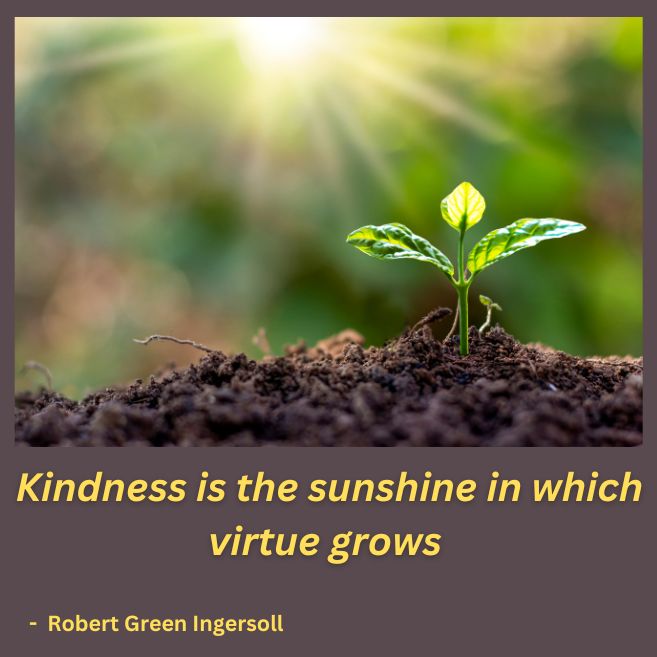
Explanation of the quote:
Imagine kindness as the nurturing sunlight in the garden of virtues. Robert Green Ingersoll’s quote beautifully captures the idea that kindness is like the essential element that allows positive qualities to flourish. Now, let’s unpack this concept and see how it paints a vibrant picture in the realm of children’s well-being.
In the landscape of nurturing children’s mental health, this quote is a guiding star. Just as sunshine nourishes plants and helps them thrive, kindness provides the fertile ground for virtues to take root and bloom. When children experience and practice kindness, they are creating an environment that allows their own positive qualities to grow.
Think about it: when a child extends a helping hand, shows empathy, or shares a kind word, they are actually cultivating a garden of virtues within themselves. These virtues – like empathy, compassion, and gratitude – become a source of emotional strength. As they practice kindness, they not only benefit others but also nurture a resilient and well-rounded inner world.
So, as educators and parents, let’s play the role of gardeners in this beautiful journey. By fostering kindness in our children’s lives, we are creating the ideal conditions for virtues to thrive. In this nurturing atmosphere, children learn that their actions can shape not only their own well-being but also the well-being of the world around them.
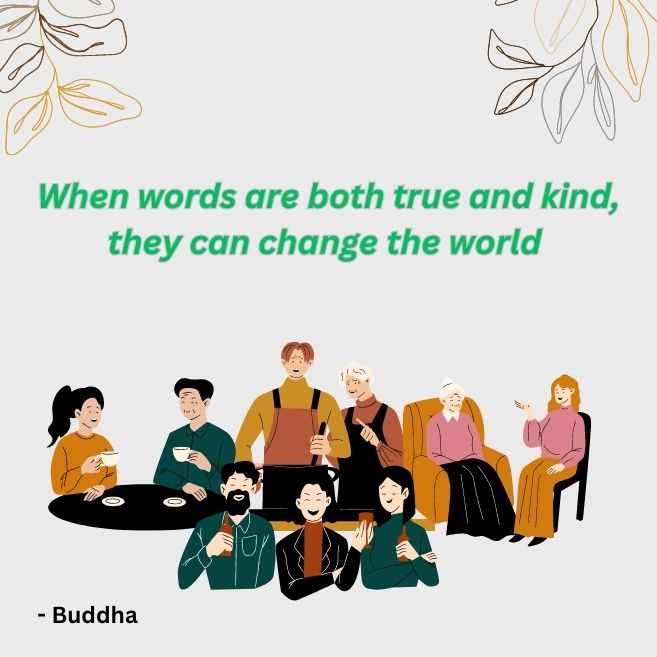
Explanation of the quote:
Imagine words as powerful tools, capable of crafting change. Buddha’s wisdom reminds us that when honesty and kindness meet in our words, they become agents of transformation. Now, let’s explore how this insight weaves into the fabric of nurturing children’s emotional well-being.
In the realm of fostering children’s mental health, this quote acts as a guiding compass. It emphasizes that our words have a profound impact not only on others but also on ourselves. When children learn to choose words that are both true and kind, they are wielding a magic wand that can create positivity and connection.
Think about it: encouraging kids to communicate with authenticity and kindness is like giving them a secret code to unlock better relationships and stronger mental resilience. When their words are a blend of truth and kindness, they are building bridges, not walls. This open dialogue becomes a channel for emotional expression, leading to improved self-awareness and understanding.
So, as mentors and parents, let’s embrace our role as language sculptors. By teaching kids the art of truthful and kind communication, we’re gifting them a skillset that not only shapes their interactions but also fuels their internal growth. With their words, they have the potential to ripple change not just through their world but within themselves.
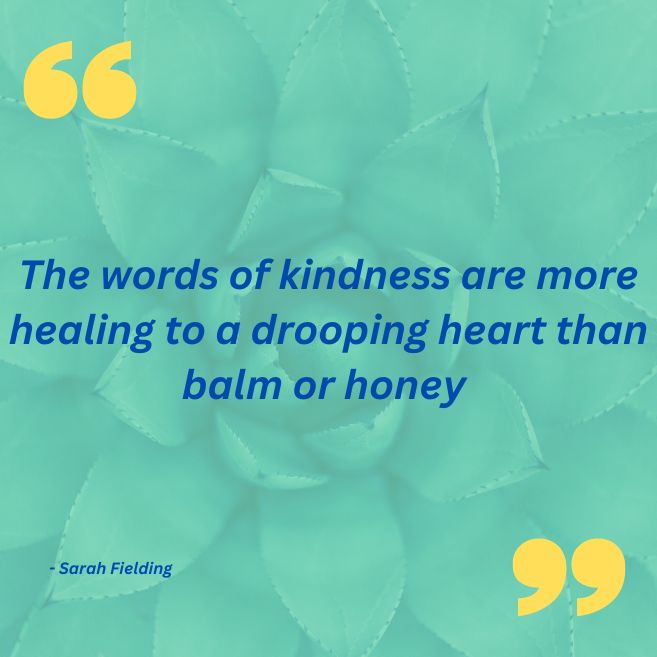
Explanation of the quote:
Imagine words as a soothing remedy, capable of healing even the weariest of hearts. Sarah Fielding’s words remind us that kindness in speech holds an unparalleled power to mend and uplift. Now, let’s delve into how this wisdom is interwoven into the landscape of children’s emotional well-being.
In the realm of fostering well-being, this quote shines as a guiding star. It underscores the remarkable impact of words on children’s hearts and minds. When children experience kindness through words, it’s like a magical elixir that rejuvenates their spirits and restores their sense of emotional balance.
Think about it: when kids hear words of encouragement, empathy, and support, it’s like a gentle hug for their hearts. These words act as a shield against negativity and self-doubt, fostering resilience and emotional strength. Just as balm soothes a wound or honey sweetens life, kind words have the power to mend wounds and infuse life with positivity.
So, let’s wear the hat of emotional healers. By teaching kids the art of using kind words, we are giving them a superpower to heal hearts, starting with their own. As they sprinkle kindness through their speech, they are sowing seeds of emotional well-being not just in themselves, but in the lives of others too.
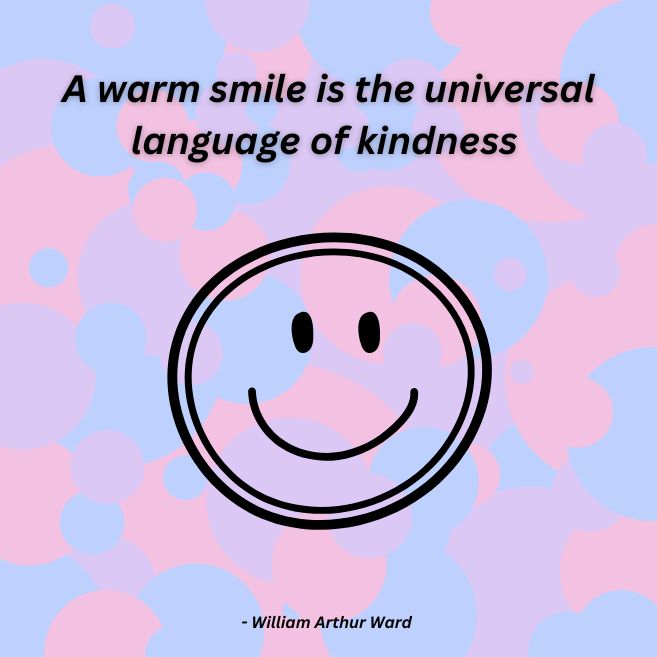
Explanation of the quote:
Imagine a smile as this magical code that everyone, no matter where they are from, understands. William Arthur Ward’s wisdom hits the bullseye – a smile is like a secret handshake of kindness that transcends words. Now, let’s dive into this pocket of positivity and see how it shapes the world of children’s well-being.
In the realm of nurturing happiness, this quote is like a beacon. It’s not just any smile; it’s that heartwarming, friendly grin that comes from a good place. And guess what? When kids beam a warm smile, they are not just spreading joy – they are boosting their own spirits too.
Think about it: teaching kids that a smile isn’t just a facial expression, but a superpower, is like handing them a treasure chest. It’s a little thing that holds incredible might. When they share that magical grin, they are planting kindness seeds everywhere they go. And as these seeds sprout, they are making their corner of the world a little brighter.
So, let’s be the cheerleaders of smiles. Let’s show our young champs that their smiles are like happiness whispers, connecting hearts without needing a translator. As they embrace this universal language of kindness, they are not just wearing a smile; they are wearing a cape of well-being that’s ready to conquer any day.
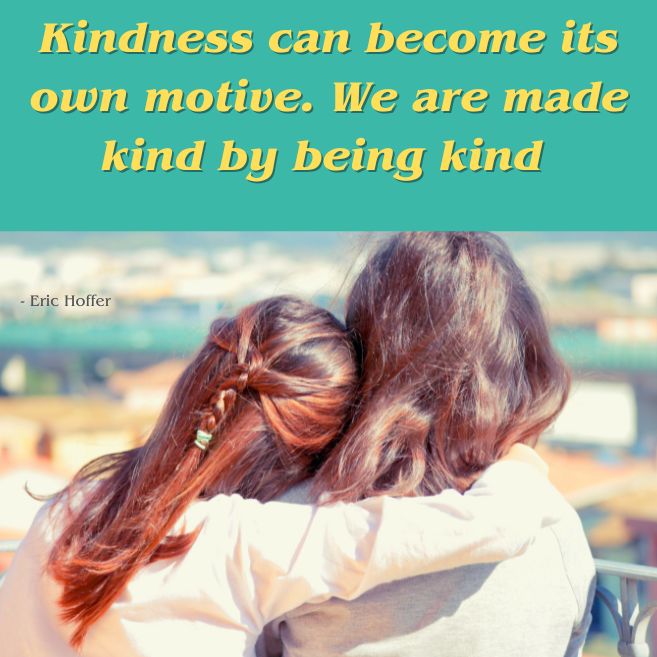
Explanation of the quote:
Imagine kindness as this magical loop, where the more you give, the more it wraps around you. Eric Hoffer’s words paint a picture of kindness as a journey that shapes us along the way. Now, let’s wander down this path and see how it merges with nurturing children’s emotional wellness.
In the realm of fostering well-being, this quote is like a lantern guiding us. It’s a whisper that kindness isn’t just a reaction; it’s a living story we write every day. When kids make kindness a part of their story, it’s not just about others – it’s about them becoming their best selves.
Showing kids that kindness isn’t just a button to press; it’s a melody that plays in their hearts. When they weave kindness into their lives, it’s like a thread that stitches their emotional tapestry. They are not just being kind to others; they are evolving into kind-hearted, strong individuals.
So, let’s be storytellers of this kindness journey. By urging kids to embrace kindness as their guiding star, we are handing them a map to a treasure of their own making. They learn that kindness isn’t just an action; it’s a force that molds them into better versions of themselves. And as they see how their kindness echoes in the world, they are empowered to create a symphony of compassion.
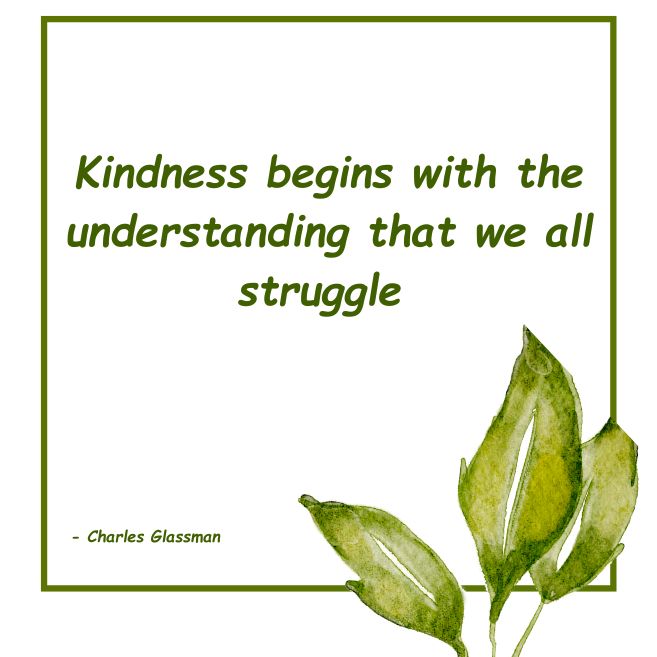
Explanation of the quote:
Imagine kindness as a bridge of empathy, connecting us through our shared battles. Charles Glassman’s wisdom highlights that kindness finds its roots in recognizing each other’s struggles. Let’s dive into this concept and see how it intertwines with nurturing children’s emotional well-being.
In the realm of fostering well-being, this quote shines as a guiding light. It’s a reminder that beneath the surface, everyone faces challenges. When kids grasp this truth, they are equipped with a perspective that fosters compassion and understanding.
Think about it: teaching kids that kindness isn’t just about helping others but also about acknowledging their struggles is like handing them a magic lens. Through this lens, they see beyond appearances and recognize the common thread of human experience. As they extend kindness to others, they are extending a hand of solidarity, saying, “I see you, and I understand.”
So, let’s be architects of this bridge of empathy. By encouraging kids to embrace kindness as a way of acknowledging shared struggles, we are cultivating a community of support. They learn that kindness isn’t just a standalone act; it’s a foundation of connection that fosters well-being for all. And as they navigate their own challenges, they all know they are not alone – they are part of a tapestry of understanding.
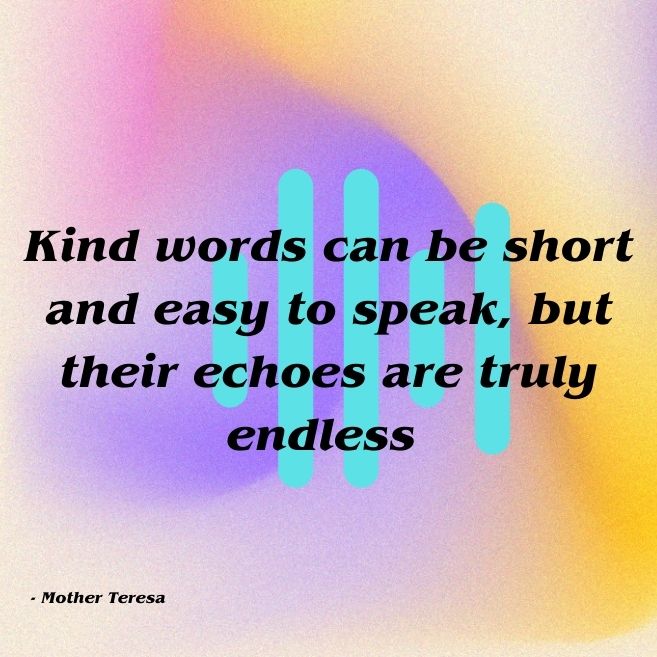
Explanation of the quote:
Imagine words as tiny pebbles creating ripples that stretch across the water’s surface. Mother Teresa’s wisdom beautifully captures that kind words, though simple, hold an eternal impact. Now, let’s dive into this concept and see how it paints a canvas of well-being for children.
In the realm of promoting emotional health, this quote stands as a beacon. It’s a reminder that our words are not fleeting; they carry a resonance that lingers. When children understand this, they’re empowered to shape their world with words that uplift.
Think about it: teaching kids that their words are like little messengers of positivity is like giving them a treasure chest of golden pebbles. Every kind word they share creates a ripple of goodness that touches not only the present moment but also the moments to come. These echoes of kindness become part of their legacy, spreading warmth long after the words are spoken.
So, let’s be artists of this kind word symphony. By encouraging children to use their words as brushes that paint the world with kindness, we are nurturing a cycle of positive energy. They learn that even a short phrase or a simple compliment can be a source of immense joy and healing for others and, in turn, for themselves.
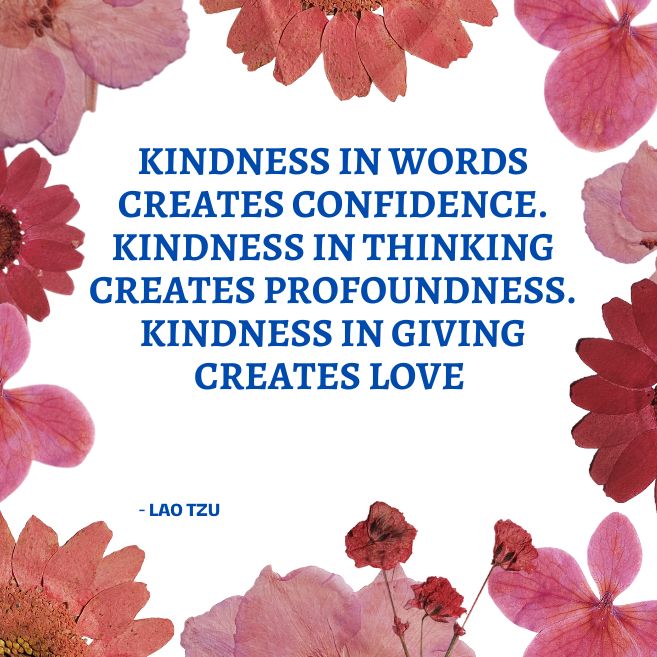
Explanation of the quote:
Imagine kindness as this multi-faceted gem, each facet radiating a unique brilliance. Lao Tzu’s wisdom beautifully captures how kindness takes different forms, each contributing to our emotional well-being. Now, let’s delve into these facets and see how they shape the world of children’s hearts and minds.
In the realm of nurturing well-being, this quote shines as a prism of understanding. It tells us that kindness isn’t a one-size-fits-all concept; it’s a symphony with different notes. When children learn this melody, they are equipped with tools that enhance their emotional toolkit.
Think about it: teaching kids that kindness isn’t just about what they do, but how they think and speak, is like giving them a Swiss Army knife of emotional strength. When they use kind words, they are not just communicating; they are building their own confidence. When they practice kind thinking, they are diving into the deep waters of empathy and understanding. And when they give kindness, they are crafting a masterpiece of love that’s felt not just by others, but by themselves too.
So, let’s be conductors of this kindness orchestra. By urging children to explore the various dimensions of kindness, we are nurturing a holistic approach to well-being. They learn that every act, every thought, and every word has the potential to shape their world and create a symphony of harmony and love.
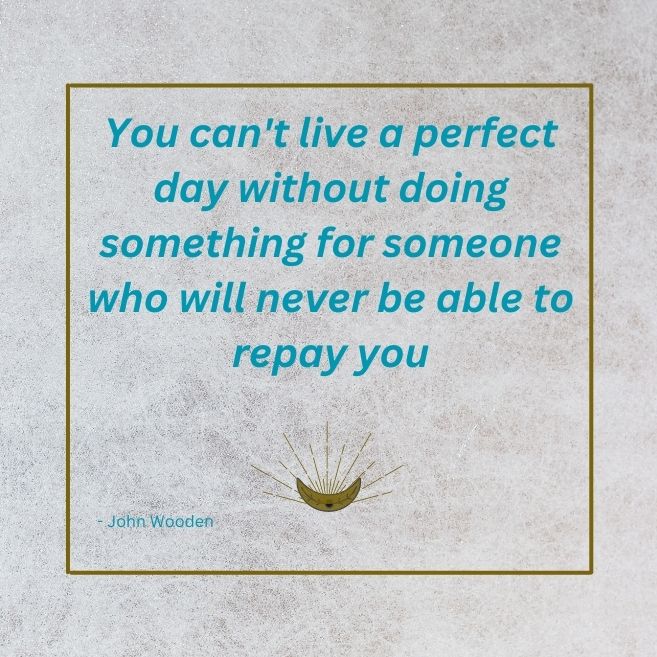
Explanation of the quote:
Imagine each day as a canvas, waiting for a stroke of kindness to complete it. John Wooden’s wisdom beautifully encapsulates the idea that true fulfillment comes from selfless acts. Now, let’s immerse ourselves in this concept and discover how it weaves into nurturing children’s emotional well-being.
In the realm of fostering well-being, this quote stands as a shining star. It’s a reminder that the essence of a perfect day lies not in personal gain, but in the joy of giving without expecting anything in return. When children embrace this philosophy, they are planting seeds of selflessness that blossom into a sense of purpose.
Think about it: teaching kids that the most satisfying moments are those when they make a difference in someone’s life, without seeking reward, is like handing them a treasure chest of heartwarming memories. Every act of kindness, whether big or small, leaves an imprint on their hearts, creating a reservoir of positivity that sustains them through life’s challenges.
So, let’s be architects of these perfect days. By encouraging children to sprinkle kindness like stardust, we’re fostering a legacy of generosity. They learn that happiness isn’t just about personal accomplishments; it’s about the imprint they leave on the hearts of others. As they enrich lives, they enrich their own sense of purpose and emotional fulfillment.
Encouraging self-care and compassion in children
In the realm of nurturing well-being, it’s like handing young hearts a treasure map with two precious landmarks: self-care and self-compassion. These aren’t just fancy words; they are like magical spells that empower children to weave their own tapestry of emotional strength, ready to face life’s twists and turns.
Picture self-care as a bouquet of kindness for themselves. It’s not just a spa day – it’s a lesson in treating their hearts like precious gardens that need tending. This gift keeps giving; it’s a daily invitation to sit with their emotions, acknowledging that it’s okay to feel, to heal, and to be human.
And then, there’s self-compassion – the art of being kind to oneself, especially in times of stumbling. It’s like handing them a velvet pillow to land on when they fall, whispering that mistakes are stepping stones, not stumbling blocks. Through self-compassion, they learn to mend their own hearts, even on the toughest days.
Parents, educators – let’s be navigators of these seas. Make self-care and self-compassion the stars in their sky. Share your stories – those moments you took a deep breath or lost yourself in a creative swirl. By showing them that adults also practice these arts, you are lighting a path they will eagerly follow.
Create havens for chats where kids feel safe sharing their feelings. Ask them, “What’s your self-care tale today?” or “Did you do something kind for yourself?” These conversations weave self-care and self-compassion into their daily rhythm, making them ambassadors of their own well-being.
